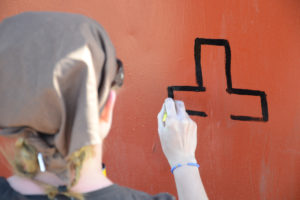
Twenty-five years ago one of my Central Asian friends looked out over her homeland—a desert landscape ravaged by governmental mismanagement and years of neglect—and pronounced it “God-forsaken.”
She had no conception of God’s deep concern and attentiveness to the struggle of her people. She didn’t realize God was beginning to soften their hard hearts. Even those of us who knew the truth—who knew our missionary presence alone was a contradiction to her statement—could’ve scarcely conceived of the depth and breadth of the movement that was coming.
Between 1991 and 2015, the number of believers among this Muslim people group grew from a handful to an estimated 15,000. God seemed to take great delight in proving our friend wrong. Her people were not God-forsaken; they were beloved.
Perseverance: The Fruit of Suffering
Growth like this is rarely without pain. We’ve had the joy of watching God grow his church here, but we’ve also witnessed the suffering through which believers are learning perseverance. We’ve seen bruises from beatings, burns from boiling water thrown in anger, and the social alienation of those who follow Jesus.
But we praise God, because we’ve also seen believers welcome the disowned into their own homes. We’ve watched the poor share their bread, and the wounded bind the wounds of others. Through it all, we’ve seen that suffering produces perseverance, and perseverance produces character (Rom. 5:3–4).
In our world there is a lot of suffering without perseverance, but there is never perseverance without suffering.
For my husband and me, our view as outsiders required little of us in terms of emotional investment at first. We rejoiced with our Central Asian brothers and sisters in their victories. We dusted them off when they fell, pointing them to a grace that is bigger than they could yet grasp. And yet, our own spiritual encouragement or frustration had little to do with that of our friends. It was as though we stood at a distance, giving them pointers for the hike, rather than journeying hand in hand with them up the treacherous path.
Then one day God began to lead us by a way we hadn’t walked before. A friend was forced by doctors to abort her baby at 28 weeks. Around the same time, we experienced a miscarriage. Suddenly, two tragedies brought us eye to eye, sharing a common pain. Amid this experience, we learned that our friend’s family wanted to know more about Jesus. “Would you help?” she asked.
Church Around a Kitchen Table
And so we began an experiment that would turn our understanding of church upside down. For nearly two years, we gathered weekly with our friend’s family around our dining room table, sharing food, stories, questions, and God’s Word. We read through the gospel of Luke. One by one these new friends said, “I want to follow this Jesus.” And though it looked unlike any church we had ever experienced, there was a rightness about it that filled us with joy and hope. We thought surely this is what Acts 2 looked like.
We were one story short of finishing the book of Luke when a conflict erupted between two sisters in the group. Privately, we asked the older sister to explain to us what had happened. She yelled, cried, and banged her fists on the table in self-righteous anger. Though she was at fault, her cultural values made it impossible for her to ask someone younger for forgiveness. She wanted to follow Jesus, but at this point his words seemed too hard for her. Both sisters were unwilling to humble themselves. As I listened to the older sister, I knew we were experiencing yet another miscarriage—this time the death of a baby church.
In a small group in which almost all the church members were somehow related, this fractured relationship affected everyone. If these women couldn’t follow Jesus in his call to reconcile to one another, they were saying no to following him. Their stubborn refusal to forgive was devastating to us. We had come to love this family deeply and wanted to see them follow Jesus and walk in his ways, but they seemed to be turning away from his call. As a result we felt like failures in ministry. The failing and the suffering were all tied up together.
Endurance Through Loss and Failure
Grief and suffering come to us in many forms through all seasons of our lives. Although my hurt over the loss of this church was different from the day-in and day-out suffering of some of my friends here, it was no less painful. I was forced to wrestle once again with God’s call to persevere.
Here is what I began to understand: the call to persevere doesn’t come when I am feeling strong, when things are going well, when my ministry seems fruitful. Instead, it comes at the very moment when I am weak, discouraged, hurting, frightened, angry, withdrawn. The call comes when I have no resources left with which to fight. Into this raw and aching tiredness, Jesus enters and says, “Blessed are the poor in spirit, for theirs is the kingdom of heaven” (Matt. 5:3).
Blessed are you when you have nothing left, when your energy is spent and your hands are empty and your wisdom exhausted. Blessed are you.
Even in the face of disappointment and death, my call is to stand firm—to cling to the dreams and promises of God.
The life of the apostle Paul also encouraged me. Beaten, hungry, shipwrecked, despised, chained—he would have been glad to die. But instead, in his utter weakness he knew the strength of God. In his poverty he had eyes to see the promised kingdom of God. And for the sake of his brothers and sisters—for the sake of Christ’s body—he was willing to suffer and persevere (Phil. 1:21–25).
In our world there is a lot of suffering without perseverance, but there is never perseverance without suffering. Paul told the Philippian believers to join with others in following his example (Phil. 3:17), and he encouraged them to stand firm (Phil. 4:1). Even in the face of disappointment and death, my call is to stand firm—to cling to the dreams and promises of God.
Hope for the Struggle
A number of years have passed since this church planting experience. We eventually moved on to another place of service. But last year we took a family trip back to visit our former home. For two days we drank tea with local friends among whom we never successfully planted a church. As we talked, we found what we once doubted we would ever see: maturity.
Although the sisters whose conflict caused so much pain never became part of a church again, others from this family are still walking with the Lord. These men and women are providing for their families, loving one another, and persevering in the faith. And the best news? A new church has been planted among them. Other Christians came after us to continue the work of discipleship and church planting. God, the giver of all life, breathed on the dust of our failures and began a new work.
No church is perfect, but Scripture reminds us that ultimately suffering leads to great hope that “does not put us to shame” (Rom. 5:5a). Jesus is building his church, and one day it will be perfect, with no spot or wrinkle (Eph. 5:27). With this assurance, and for his glory, we press on.
Sarah Alexander and her family serve with IMB in Central Asia. She has been writing about the region since 1991.
Disappointment and suffering—painful as they are—may be used for the glory of God and the good of his people and those he is calling to himself. Here is one such story. Here is another article, as well, that addresses common costs of a life on mission.


